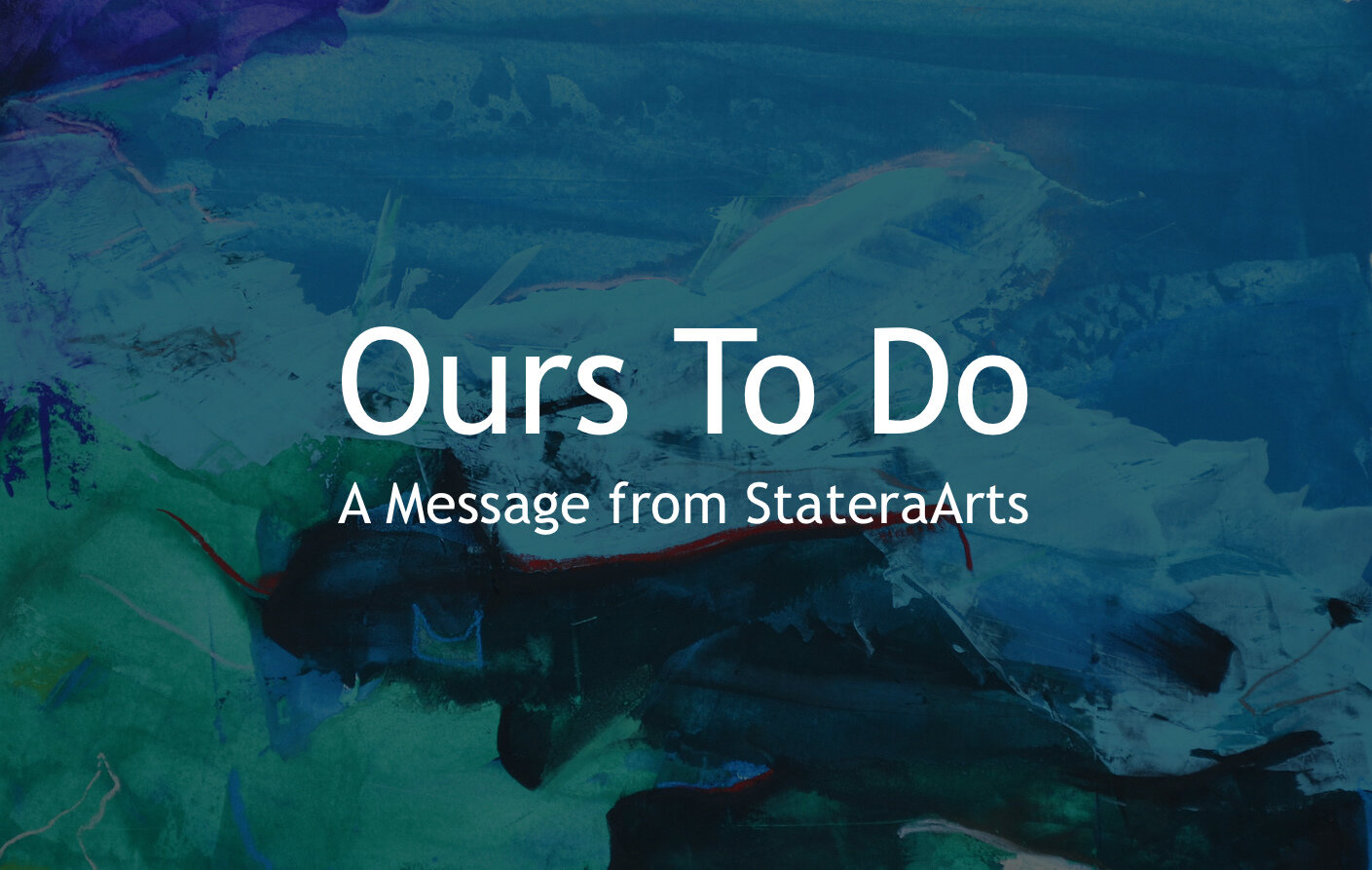Last week StateraArts issued a bold call-to-action: transform the theatre work-week. Statera’s call to action is an invitation to interrogate and disrupt outdated scheduling practices and implement humane work week processes that support everyone in the theatre work force.
In the past few days, hundreds of theatre makers, arts administrators and leaders have responded to Statera’s call and pledged their support. They’ve also shared their stories on social media using the #StateraWorkWeek and #BalanceTheatreWorkWeek hashtags. They’ve shared strategies, successful policies, and exciting ideas about how to affect change in the American Theatre. Today, we’re sharing a few of those stories with more to follow in the weeks to come!
SOLUTIONS from the industry
“I am the Artistic Director of MN based Collide Theatrical Dance Company. We have a Parents in the Arts program that offers free onsite childcare to all our artists during rehearsals and performances. The childcare providers are all recent graduates of the Guthrie BFA program who are pursuing a performing career. We rehearse Monday- Friday 10-4 so that our artists can spend evenings and weekends with their families.” - Regina Peluso
“Minnesota Opera just tried a 5-day rehearsal week, with a half day of work, but no rehearsal (fittings, coaching Music work). This also allowed for the stage management team (of which I’m a member) to have a full work day uninterrupted to be dedicated to desk time for paperwork, meetings, etc. I will continue to champion the need for this schedule through the season at this company, and at future companies I take my work to.” - Jerry K Smith
Technicians for Change is an organization whose mission is to educate, connect, and empower entertainment technicians on workers rights and protections including reasonable pay, safer practices, and legal worker classification. Technicians for Change is actively engaging with theaters centered in Minneapolis area, gathering information about their work practices, and innovating around the nature of the theatre work-week. Connect with them HERE.
“I am one of the founders of the Re-Imagine LA Theatre Initiative, and we stand for these important changes on top of an end to wage theft in no-pay and low-pay stage work.” - Kyle Nudo
“No artist should be excluded from their art because they have chosen to have a family. At InBocca Performance, children are welcome, partners are welcome, and we create a space that is inclusive of the needs of working mothers/fathers/grandparents and other caregivers.” - Caroline Stine
“Red Octopus Theater Company has always allowed my son at rehearsals. We are always done by 9pm and are never called to rehearsal if we are not working a scene we are in. There is a full kitchen in the green room for anyone who didn't have time between work and rehearsal for meals.” - Miranda Carter
“We end rehearsals at 10, implement daytime rehearsals whenever possible and "pre-tech" the show without actors and crew (just director, lighting designer and stage manager). We put limits on rehearsal hours for directors of staged readings. Often we rehearse five days rather than six. The educational component of our theatre (classes and productions) operates by the same guidelines.” - Suzy Newman
“Pawling Theatre Exchange offer space for artistic entities in by handing them the keys and let them dictate their work schedule -- 24 hour access. We offer an extra dorm room and meals for parents/caregivers at a reduced cost. Our rehearsals for new works are 3-4 hours for the actors, allowing for the playwright/director team to work outside of the rehearsal time and to dictate their own schedule. Our spaces are all accessible.” - Tracy Liz Miller
Solutions from Training Institutions
“I have done away with the traditional Sunday Strikes. They devalue people's weekend time for a ritualized and unnecessary post closing decompression. Night work calls are prohibited in my theatres and shops. We refuse to work 10 out of 12s, even if it is the "professional standard". All technical rehearsals must happen within the confines of a 9 hour call that will include at least 45 minutes for a meal break and two 10 minute breaks.” - Zachary Stribling, University of Kentucky
“Many of our students have jobs and families to support as well as full time school schedules as well as the more obvious challenges of keeping body and soul together financially, many students of color do not feel safe rehearsing at night. I am now committed to finishing rehearsals by 9:00 and instituting afternoon and and early evening rehearsals where I can.” - Molly Noble, College of Marin
“We work in developmental stages over longer stretches (months) rather than the standard 4 weeks crunch when creating a new original piece.” - Kate Amory, Berklee College of Music
“As a professor at Rowan University I have changed the six day a rehearsal week structure to guarantee a weekend day OFF so students can be people too. We are seeking a new standardized structure to support health and wellbeing for all!” - Michael Dean Morgan, Rowan University
“I took over the Neosho County Community College Theatre Department in 2018, and immediately made some changes.
Rehearsal are from 2-5pm, instead of 7-10. This means students including non-trads have their evenings free and can more easily maintain their coursework and a work/life balance with proper sleep.
Tech week is 2-5pm and 6-10pm. Dinner break is included and respected. Healthy snacks are provided. We always end at 10pm so proper sleep can happen.
We have clear and frequently stated inclusive and anti-racist policies.
We have limited Saturday calls and do five day work weeks as much as possible. When students are called on Saturday, both breakfast and lunch are provided. The entire production schedule is handed out at the beginning of each semester.” Tricia Stogsdill, Neosho County Community College
Individual Theatre Workers Respond
“As a freelancer, I’ve built into my schedule at least one day off per week. Even that can be hard to maintain and still make a living as one has to bounce from job to job. However I am going to be making an effort to increase my time off to two days a week regularly. Additionally, I will be keeping track of my hours specifically to show general managers what they are asking of their employees.” - Jeffrey Salerno
“I am a sound and projection designer. One of the most successful tech weeks I had was alternating 10/12s and 10am-6pm.” - Sadah Proctor
“My director has been trying to get us out of rehearsal an hour early the past few days. We've also done a few straight sixes, so that even on days when we have a production meeting, we will still be done by 5PM and home in time for a normal dinner and evening routine.” - Brianna Roche
PLEDGE TO TRANSFORM THE THEATRE WORK WEEK
Transforming the theatre work-week is essential to the health of our industry. Our work-force deserves better. They deserve to show up to this work as a whole human being. There is not a one-size-fits-all answer, but together we can affect serious change in the industry.
Commit to Statera’s call-to-action to balance the theatre work-week and let us know how we can support you by filling out the form on call to action! Thank you!
_format-1500w.png)






